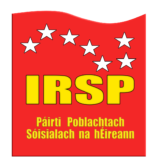The Queens University Republican Congress held a public meeting on Thursday 24th November at the Elmwood Learning Centre on the theme:
Political Policing in Ireland- Ten Years of the RUC/PSNI
Addressed by: Chris Donnelly (RC/IRSP), Stephen Murney (éirígí) and Ciaran Murphy (RNU)
The IRSP member, Chris Donnelly’s contribution is reproduced below:
“So, to begin I’d like to borrow a quote from Frantz Fanon,
“The colonial world is a world cut in two. The dividing line, the frontiers are shown by barracks and police stations…In the colonial countries, the policeman and the soldier, by their immediate presence and their frequent and direct action maintain contact with the native and advise him by means of napalm and rifle butts not to budge. It is obvious here that the agents of government speak the language of pure force.”
The north of Ireland however has always been a much more nuanced place in terms of the relations between the coercive forces of the state and the mass of the population, despite the function of the coercive bodies of the state in any given era being the guardians of feudal and bourgeois private property. To begin to understand this we have to look at the nature of the northern state from its inception in 1922 and the historical forces that coalesced determining its outcome and nature.
Repressive bodies of the state in Ireland did not solely emerge from the colonial administration in Dublin castle. Crucially if we are to understand the nature of repression in Ireland and the social forces underlying it we must take heed of this. A great deal of autonomy has always characterised policing in the north especially, the orange order emerged from the peep o day boys in the late 18th century as a means of suppressing the catholic defenders attacks on local landowners property. Ulster landowners were instrumental in raising forces such as the orange order and the yeomanry, a particularly brutal militia who were heavily involved in suppressing peasant revolts throughout the early – mid 19th century. Also in the urban centres, Dublin retained an autonomous metropolitan police force which engaged in one of the most brutal suppressions of the Irish working class at the behest of the Irish bourgeoisie, during the 1913 lockout.
Subsequently the now historical dual system of regionalised bodies of armed men, loyal to various local landlords and demagogues, in conjunction with the regular state forces, was to characterise the development of ulster and the northern state in the 20th century. These were eventually absorbed into the RUC and A,B & C specials, allowing sections of the protestant population relatively steady employment and a stake in the state alongside the marginally privileged regular working class. Sectarianism subsequently functioned as a divisive measure employed by the orange ruling class, using the catholic working class as a reserve army of labour thereby keeping wages of protestant workers low and negating often the possibility of a united working class movement. Possibilities such as the 1932 outdoor relief strike were bludgeoned off the street by the RUC and any attempts to militate against the state were decried by the ruling class as conspiracies emanating from Rome or Moscow.
At the inception of the northern state, the ulster bourgeoisie and landed class relied on a purely militarised form of state to enforce its hegemony, with the concentration of armed force, legislative power and judicial process in their possession. Crucially we must take note that these military organs of coercive power are representative of the class nature of the state, forged in the social contract between the big house landowners, business interests and sections of the protestant working class. With the calls in the late 1960’s for meagre democratic reforms, the orange ruling class could only respond with violence. State violence was met however with disciplined and relentless opposition in the Bogside in 1969. ‘Free Derry’ remains an example still today of a truly democratic and ultimately effective means of autonomous community organisation.
The class nature of any state is crucial in understanding the form and function of its coercive bodies. Under capitalist relations of production, society is split into largely two antagonistic forces: proletarians and the bourgeoisie. The state as Friedrich Engels analysed, is human society at a particular state of development, whereby the population has split into antagonistic classes. The state them emerges from society but places itself above it.
By placing itself above society, the state becomes a regulator for the existing organisation of class forces and economic interests, in our era the maintenance of the struggle between labour and capital at such a level that does not constitute a threat to the social order. Special bodies of armed men are subsequently needed as a coercive means of regulating this struggle, however are employed solely in the interests of the ruling class against the exploited class. It must also be mentioned that coercive armed bodies do not solely represent the entire arsenal of the state, material appendages such as prisons, judicial systems, paid agents, and arrays of advanced technological equipment characterise the policing of populations today, this is no different in the north of Ireland.
Coercive state force is also always concentrated into the hands of a small elite, this historically being the orange elite in the north, but we must ask how has this changed and how should we respond?
Policing no longer functions on the basis of protecting the property of the antiquated orange elite, but in representing itself as a normal, even progressive institution of civil society. This is a distortion of the true nature of coercive state force and such distortions only serve to dull the consciousness of the broad mass of people.
We are now at a stage where the power of the old orange state has been eroded, although we have not undergone a revolution in terms of the relation between the state and the people, by no means. We live in an era of rampant neoliberalism, characterised by a transient low wage economy, poverty, alienation and acute sectarianism, these are all supposedly signs of a normal society however I would argue that these are merely modern manifestations of much older problems. The contradictions at the heart of this state have merely been masked by the edifice of enforced neoliberal optimism and the regularity of violence that the PSNI employ is swiftly eroding this edifice. Within working class republican areas the PSNI arouse antagonisms in that they are seen still as a foreign force, which is confused slightly from the days of the RUC, given there is a large degree of co-operation at local and state level by the elected representatives of republicanism. Within unionist working class areas, as in republican areas, the PSNI arouse antagonisms due to an innate reaction against authoritarian forms of social regulation. In any case, there is a general consensus amongst the working class that policing is unacceptable. However we should always expose the true function of policing whenever we can, highlighting its role in both suppressing the working class and protecting the privileges of the ruling class. Again, to present the role of policing in any other light than within the conflict between opposing social classes would be to mislead and dull the consciousness of the working class movement. This is an important point to note as class struggle has always and continues to exist within capitalist societies whether under imperialist occupation or not. The defeat of imperialism does not preclude the opening up of the class forces on a higher political level, but the struggle against imperialism and the struggle for the emancipation of the working class are inseparable aspects of the class struggle in Ireland as a continuing dialectic process. This was the understanding of Connolly and is where we must draw our analysis from today.
The former insurrectionists believe that the illusion of control over the armed bodies of the state can lead to some mysterious gains for the broad mass of people. As Lenin noted, previous revolutions have only perfected the strength and efficiency of the state and its various institutions, the point however is to destroy the state and the form of society which warrants the regulation of antagonistic classes by repressive armed bodies.
Thank you”
.



